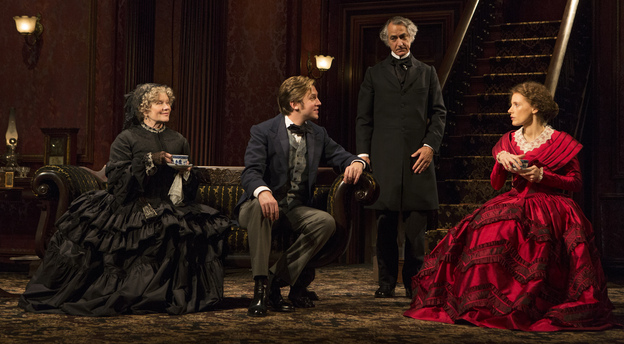“The intellectuals’ chief cause of anguish are one another’s works.”
Jacques Barzun, The House of Intellect (courtesy of Edward Rothstein)
Archives for 2012
TT: Twice in a lifetime
Mrs. T and I returned to our place in Connecticut yesterday, turned on the TV, and saw what was happening in New York City, my other adopted hometown. Friends of mine who live there have been plunged into a daily misery that is shockingly new to them, and for the most part they’re unable to spread the word about their situation because they have no electricity. I grieve to behold their plight.
 Train service from Connecticut to New York is limited and erratic. Even if we could get to our apartment in upper Manhattan, we’d be stuck there, since our subway stop is out of service. So here we sit, watching the news and marveling anew at the harshness of life–from a distance.
Train service from Connecticut to New York is limited and erratic. Even if we could get to our apartment in upper Manhattan, we’d be stuck there, since our subway stop is out of service. So here we sit, watching the news and marveling anew at the harshness of life–from a distance.
It happens that I was in Smalltown, U.S.A., on 9/11, and wasn’t able to fly back to New York for five agonizing days. Much the same thing is happening to me now. The experience, as I wrote not long afterward, was deeply unsettling:
I awoke to find myself a stranded man, unable to return to New York to share whatever its fate might be. Of course I had it easy, far more so than most of the thousands of other Americans who had been caught short on that bright Tuesday morning. Some of them were in the air, others in strange hotel rooms, but I was holed up with my mother in the small town where I had spent the first eighteen years of my life. My brother and his family lived just three blocks away. As exiles go, mine was to be both comforting and comfortable–and brief. But it was an exile all the same, and with every passing minute it grew harder to endure….
No doubt Dr. Johnson, that most cold-eyed and hard-headed of sages, would dismiss what I wrote back then as cant. None but a fool longs to share suffering needlessly, there being more than enough of it in one man’s lifetime to go around. That said, it still feels strange–and sad–to be exiled from a suffering New York City yet again.
TT: The jilter jilted
In today’s Wall Street Journal drama column I review the new Broadway revival of The Heiress. Here’s an excerpt.
* * *
“The Heiress,” adapted by Ruth and Augustus Goetz from “Washington Square,” Henry James’ 1880 novella about a plain young woman of means who is courted and jilted by a gold-digging suitor, ran for a year in New York, after which William Wyler turned it into one of the finest screen versions of a classic ever to be made in Hollywood. The original play has since been revived several times on Broadway, most recently in the unforgettable 1995 Lincoln Center Theater production that made Cherry Jones a star. Now it’s receiving a big-name revival featuring Jessica Chastain. Though I wish I could be more enthusiastic about the results, this production, which is uneven but not unrewarding, will at least serve to introduce those who don’t know “The Heiress” to its manifold excellences.
 It’s remarkable that the Goetzes were able to transform so elegantly turned a book as “Washington Square” into a fully stageworthy play, and even more remarkable that they contrived to do so without compromising its essence. Not only did they incorporate much of James’ dialogue into the script, but they also stuck close to his plot, adding only two neat and very effective touches of climactic melodrama. What disappeared along the way was the sardonic narrative voice in which James tells the tragic tale of how Catherine Sloper (Ms. Chastain) avenges herself on Morris Townsend (Dan Stevens) for dashing her romantic hopes–and on her well-meaning but cold-hearted father (David Strathairn) for always having treated her like a homely dullard. Fortunately, Dr. Sloper’s part contains more than enough “light remnants and snippets of irony” (James’ phrase) to make up for what has been lost in translation, especially when it’s played with the blandly stealthy malice that Ralph Richardson brought to the role on screen in 1949.
It’s remarkable that the Goetzes were able to transform so elegantly turned a book as “Washington Square” into a fully stageworthy play, and even more remarkable that they contrived to do so without compromising its essence. Not only did they incorporate much of James’ dialogue into the script, but they also stuck close to his plot, adding only two neat and very effective touches of climactic melodrama. What disappeared along the way was the sardonic narrative voice in which James tells the tragic tale of how Catherine Sloper (Ms. Chastain) avenges herself on Morris Townsend (Dan Stevens) for dashing her romantic hopes–and on her well-meaning but cold-hearted father (David Strathairn) for always having treated her like a homely dullard. Fortunately, Dr. Sloper’s part contains more than enough “light remnants and snippets of irony” (James’ phrase) to make up for what has been lost in translation, especially when it’s played with the blandly stealthy malice that Ralph Richardson brought to the role on screen in 1949.
Mr. Richardson was, of course, one of the foremost classical stage actors of the 20th century, but Mr. Strathairn is a formidably accomplished artist in his own right, and so it surprised me that he has chosen to play Dr. Sloper not with sly urbanity but as a querulous, near-provincial gent who seems at times almost to be soliciting the audience’s sympathy….
Ms. Chastain’s performance, certain affecting moments notwithstanding, is too often vocally flat and dramatically unsubtle in a way that you wouldn’t expect from a classically trained actor with a fair amount of stage experience. She lacks the adamantine toughness without which the final scene of “The Heiress” cannot make its proper impact…
* * *
Read the whole thing here.
An excerpt from William Wyler’s 1949 film version of The Heiress, starring Olivia de Havilland and Ralph Richardson. The score is by Aaron Copland:
Cherry Jones talks about the 1995 revival of The Heiress:
TT: Found poem
Vito
Psychic
Proprietor
Guest
Used car dealer
Big Louie
The Maharajah
Delivery man
Croupier
Mysterious figure in Linz’s office
Indian chief
Mr. Atkins
Sal Nichols (The Pig)
Wealthy Syrian
East Indian potentate
Mr. Muckerji
Capt. M. Renard
Piano Player Harry (uncredited)
Native guard
TT: Almanac
“‘It seems to make you very happy that your daughter’s affections have been trifled with.’
“‘It does,’ said the Doctor; ‘for I had foretold it! It’s a great pleasure to be in the right.’
“‘Your pleasures make one shudder!’ his sister exclaimed.”
Henry James, Washington Square
CD
A Sonata Recital by Joseph Szigeti and Béla Bartók. Recorded live at the Library of Congress in 1940, this concert features the most interesting violinist of the twentieth century, accompanied by one of the greatest composers of all time. Beethoven’s Kreutzer Sonata, Debussy’s G Minor Sonata, and Bartók’s own First Rhapsody and Second Sonata are all played with jaw-dropping spontaneity and individuality. The sound is only fair, but who cares? That this performance was recorded for posterity is a blessing (TT).
REVIVING SIDNEY BECHET
“The musical score for Woody Allen’s unexpected 2011 hit, ‘Midnight in Paris,’ features songs intended, like the film itself, to evoke the spirit of the City of Lights in the 1920s. The musical performance that opens the movie is a jazz recording called ‘Si tu vois ma mère.’ It dates not from the interwar years but was instead cut in 1952 by a soprano saxophonist whose sound–huge, nasal, and piercing, with a startlingly wide vibrato–is as atypical of jazz as the French-flavored song itself. ‘Si tu vois ma mère’ (‘If you see my mother’) delights everyone who hears it, and the sublime mood in which it drenches ‘Midnight in Paris’ was partly responsible for the movie’s surprising success…”
TT: So you want to see a show?
Here’s my list of recommended Broadway, off-Broadway, and out-of-town shows, updated weekly. In all cases, I gave these shows favorable reviews (if sometimes qualifiedly so) in The Wall Street Journal when they opened. For more information, click on the title.
BROADWAY:
• Bring It On (musical, G, closes Dec. 30, reviewed here)
• Evita (musical, PG-13, most performances sold out last week, reviewed here)
• Once (musical, G/PG-13, all performances sold out last week, reviewed here)
• Who’s Afraid of Virginia Woolf? (drama, PG-13/R, reviewed here)
OFF BROADWAY:
• Avenue Q (musical, R, adult subject matter and one show-stopping scene of puppet-on-puppet sex, reviewed here)
• The Fantasticks (musical, G, suitable for children capable of enjoying a love story, reviewed here)
• The Freedom of the City (drama, PG-13, closes Nov. 25, reviewed here)
• Tribes (drama, PG-13, closes Jan. 6, reviewed here)
